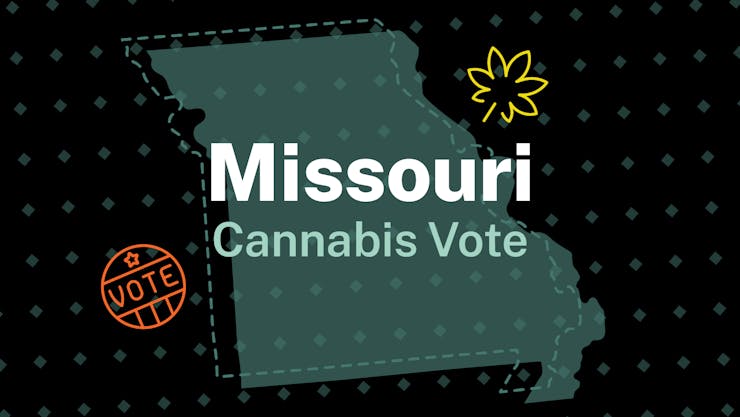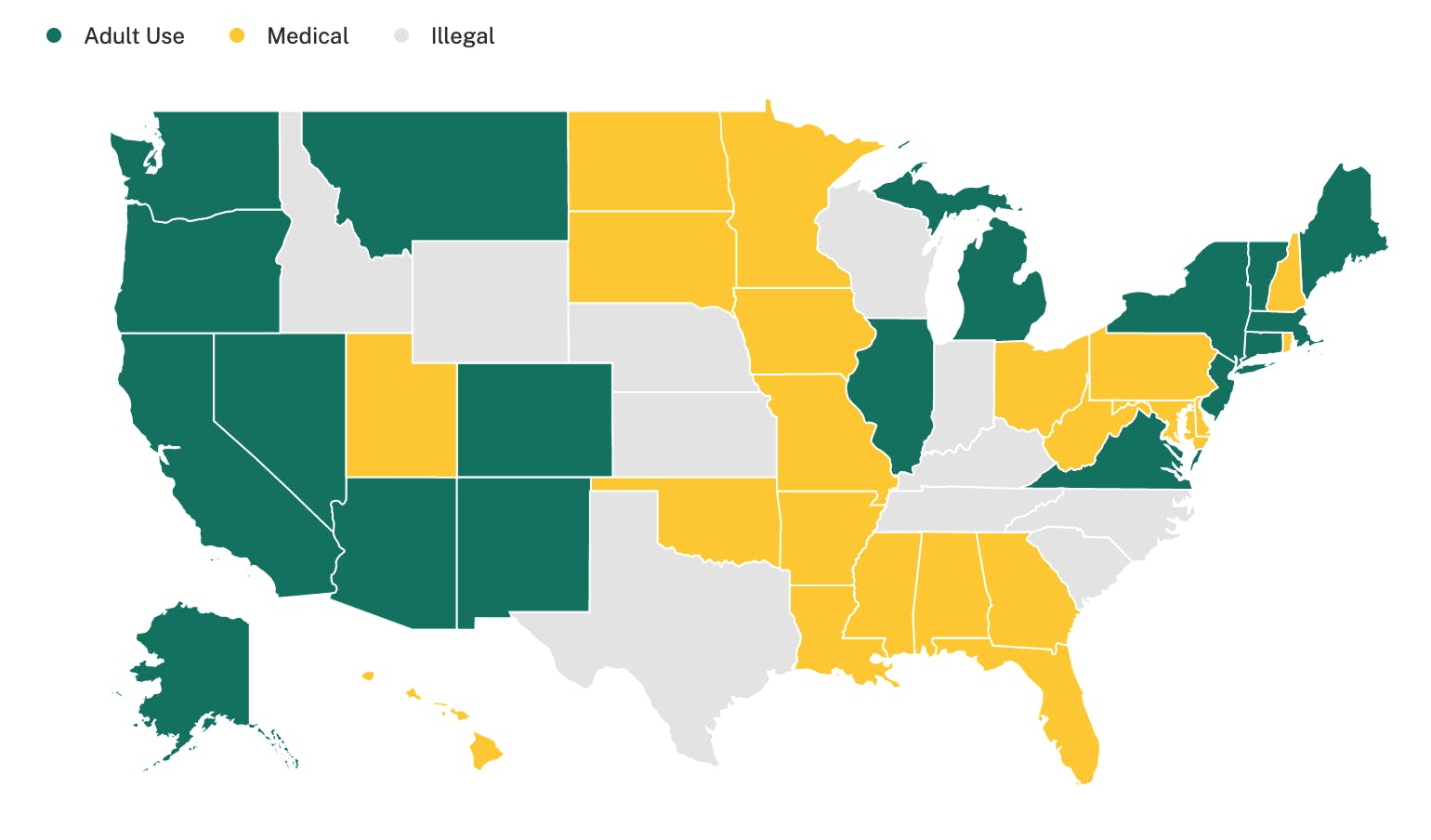Missouri’s cannabis legalization initiative
On Aug. 9, Missouri’s secretary of state confirmed that voters will approve or reject adult-use marijuana legalization on this fall’s Nov. 8 ballot.
Exactly a month later, on Sep. 9, a state judge tossed a lawsuit brought by legalization opponents that sought to remove the measure from the ballot.
Read the full 38-page proposal here: Missouri’s cannabis legalization constitutional amendment.
Is this medical or adult use legalization?
Adult use (recreational). Marijuana would be legal for all adults age 21 and older.
What’s the current law?
Medical marijuana has been legal in Missouri since voters passed a previous constitutional amendment in 2018. The first licensed dispensaries opened in Oct. 2020. Cannabis remains illegal for those without a medical card.

What the initiative would do
Missouri’s proposed constitutional amendment would amend the state constitution to legalize the possession and use of cannabis for adults 21 and older. Adults would be allowed to purchase and possess up to three ounces of cannabis flower or its equivalent.
The initiative would also allow adults to grow cannabis at home, with a state-issue registration card. The card would allow a per-person maximum of six mature plants, six immature plants, and six clones. Any household, regardless of the number of occupants, would be limited to a total of 12 mature plants, 12 immature plants, and 12 clones.
The amendment would set in motion a process of automatic expungement, where the state would be responsible for erasing past marijuana-related convictions.

How do I vote in Missouri?
This is important: Verify your registration status and ID validity right now, while there’s still time to bring both up to date.
Vote in person, on paper ballots, on Tuesday, Nov. 8, 2022. Polling stations will be open from 6:00 a.m. to 7:00 p.m. statewide. Click on this link to find out where to vote in Missouri.
Shop highly rated dispensaries near you
Showing you dispensaries nearNot sure if you’re registered, or current? Check with the Missouri Secretary of State’s web site, which has an instant easy way to verify your status.
Voting takes place in person, not by mail.
Remember to bring your valid ID to the polling station.
Absentee voting is allowed, check with the state website to see how it’s done.
What’s required to pass legalization?
In Missouri, a proposed constitutional amendment must only gather a majority of votes cast in a statewide election. In other words, 50.01% approval will pass it.
If it passes, when would marijuana be legal to possess?
Possession would become legal for all adults on Dec. 8, 2022.
How much can I possess?
Adults 21 or older may possess up to three ounces of cannabis flower, or its equivalent in other products. Once state-licensed stores open, consumers may purchase up to three ounces per day.
When could I start growing my own?
Missouri would require home cannabis growers to obtain a $100 homegrow card, renewable annually. Applications for homegrow cards will be, by law, available no later than Jan. 8, 2023, and the state will start considering those applications no later than Feb. 8, 2023.
When would weed stores open?
As early as Feb. 8, 2023. The proposed amendment allows all existing medical marijuana businesses to convert their medical licenses into “comprehensive” (medical and adult-use) licenses.
Those license conversions would be automatic for all existing companies in good standing with the state, and would go into effect as early as Feb. 8, 2023.
Could I smoke a joint in public?
No. Smoking cannabis in public would be penalized by a fine of up to $100, but not arrest.
Will it pass? Here’s what the latest polls say
The legalization measure heads into the autumn campaign season with a healthy lead, according to the latest polls.
A Survey USA poll of nearly 2,000 registered voters taken in late July found:
- 62% support marijuana legalization
- 26% oppose marijuana legalization
- 12% were unsure
July 2022 poll: Missouri marijuana legalization
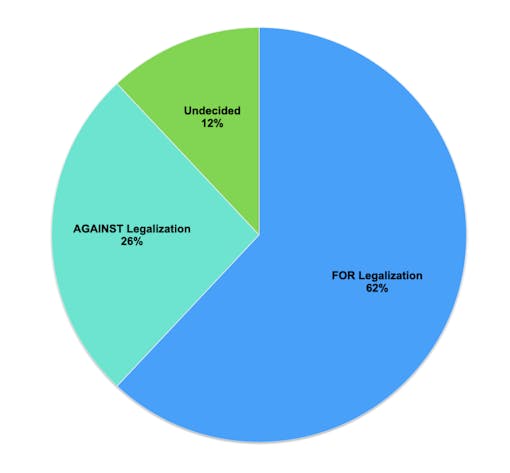
Legalization initiative sponsors
Legal Missouri 2022 is leading the way. The group’s campaign manager is John Payne, a Washington University graduate and former vice president of Students for Sensible Drug Policy. In 2018, Payne managed the successful campaign to legalize medical marijuana in Missouri. He is the founder of Amendment 2 Consultants, where he works with legalization advocates and licensed cannabis businesses across the country.
nationwide.
Legalization initiative opponents
The proposed amendment is opposed by Missouri resident Joy Sweeney, a staff member of the Community Anti-Drug Coalitions of America. On Aug. 19, Sweeney filed a challenge to the amendment, claiming that advocates did not have enough signatures from a specific congressional district, and that the proposed amendment violates the state’s single-subject rule with regard to constitutional amendments.
The proposed amendment is opposed by Missouri resident Joy Sweeney, a staff member of the Community Anti-Drug Coalitions of America. On Aug. 19, Sweeney filed a challenge to the amendment, claiming that advocates did not have enough signatures from a specific congressional district, and that the proposed amendment violates the state’s single-subject rule with regard to constitutional amendments.
Her challenge is being backed by the Protect Our Kids PAC, a new political group founded earlier this year by Luke Niforatos, executive vice president of SAM (Smart Approaches to Marijuana), the prohibitionist group headed by Kevin Sabet.
Would cannabis stores be licensed?
Yes, by the Missouri Department of Health and Senior Services.
The initiative mandates a one-time fee of $7,000 for a cannabis retail license application. Applicants who are chosen must then pay a $10,000 annual fee per retail facility. The license must be renewed every three years, for a renewal fee of $3,000.
The initiative includes a provision preventing a single business entity from owning more than 10% of the total number of retail licenses issued by the state.
Any equity or small-business licenses?
Yes. The initiative mandates the issuance of at least 144 licenses for cannabis microbusinesses, with priority given to low-income applicants and those harmed by the long history of marijuana prohibition. Look for those applications to be available in June 2023.
Can new businesses apply for a license?
The proposed amendment stipulates that through the end of 2023, only applications for cannabis microbusiness licenses will be considered.
Applications for non-microbusiness licenses, from marijuana business entities not already licensed as medical marijuana companies in Missouri, will be considered no earlier than July 2024.
How many weed stores will be allowed?
Initially, in Feb. 2023, there could be as many as 191 recreational weed stores open in Missouri. (That’s the number of existing medical dispensaries, whose licenses will expand to include adult-use sales if the company so chooses.)
The proposed amendment contains no hard maximum limit on the number of cultivation, processing, and retail licenses issued by state regulators.
There is a minimum number of licenses, however: The state must issue at least as many full adult-use cannabis licenses as exist for medical marijuana growers/ processors/ retailers as are operating on Dec. 1, 2022.
What does that actually mean? As of July 2022 there were:
- 191 licensed medical marijuana dispensaries
- 70 licensed medical marijuana processors
- 49 licensed medical marijuana cultivators
The initiative allows state regulators to exercise their judgment regarding the number of total licenses, within this legal guideline: “The [state regulatory department] may lift or ease any limit on the number of licensees or certificate holders in order to meet the demand for marijuana in the state and to ensure a competitive market while preventing an over-concentration of marijuana facilities within the boundaries of any particular local government.”
When would microbusiness applications be available?
The amendment stipulates that applications for adult-use cannabis microbusiness licenses must be issued no later than mid-June, 2023.
The state must begin accepting applications no later than mid-September, 2023.
There is no firm date for the issuance of microbusiness licenses, but that would likely start to happen around Dec. 2023.
Could local towns or counties ban stores?
Yes, but a local ban on state-licensed cannabis stores could be put into place only by a full public vote, not merely a vote by the local city or county council.
The proposed amendment stipulates that a local ballot measure on cannabis license prohibitions may take place only once every four years, on the same November general ballot as presidential elections. And the measure must receive at least 60% approval to pass.
In other words: A local “opt out” vote may take place in Nov. 2024, and Nov. 2028, and so on.
Would medical marijuana patients be protected?
Yes. There are several measures within the amendment aimed at protecting and expanding the rights of Missouri’s medical marijuana patients. See below.
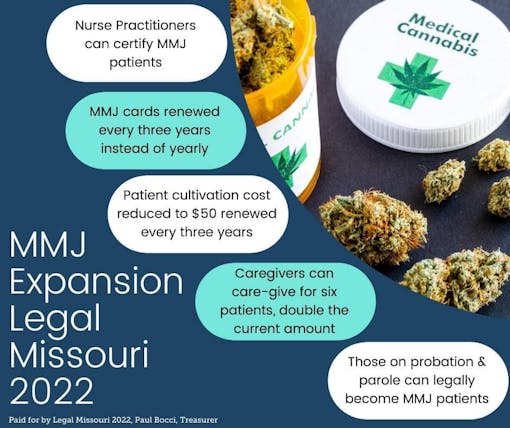
Would marijuana be taxed?
Yes. As in all other legal states, Missouri would add a cannabis excise tax to every purchase.
Adult-use marijuana sales would be taxed at 6% under the Missouri measure. The tax is estimated to bring in more than $46 million during the first full year the amendment is in effect and close to $70 million the following year.
Cities and other municipalities could add a local sales tax on recreational marijuana up to 3%.
Missouri has an existing 4.225% sales tax on all retail items (plus local sales tax). So consumers could see a tax as high as 13% to 15% on their cannabis purchases. That’s relatively low. Consumers pay as much as 25% to 40% tax in other legal states.
Missouri’s existing 4% excise tax on medical marijuana would remain in effect.
Where would marijuana tax revenue go?
State cannabis excise tax revenues would be earmarked for veterans’ homes, drug treatment programs and public defenders. See below.
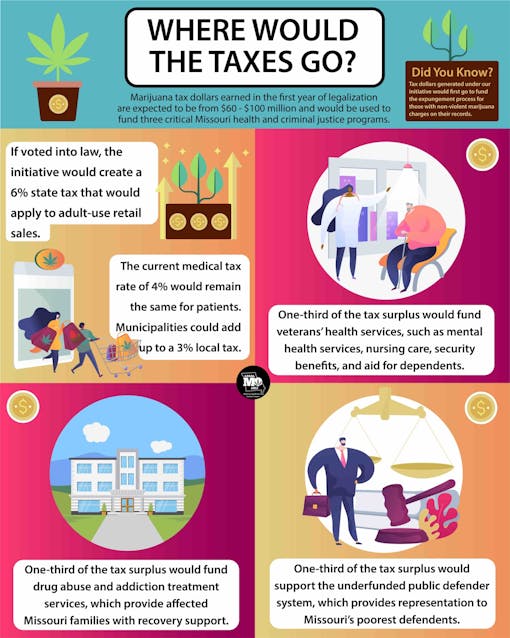
What about the expungement process?
The Missouri proposal would erase past marijuana-related convictions for nonviolent offenders and those whose convictions didn’t include selling to minors or driving while high.
The amendment gives courts six months to expunge past misdemeanors and a year for eligible felonies.
In most other legal states, expungement of prior cannabis convictions were the responsibility of the affected individuals. Some states passed provisions to remove past convictions, following the legalization vote.
If the proposed amendment passes, Missouri would be the first state to include automatic expungement of those past convictions in the legalization law itself.
Didn’t Missouri recently vote on marijuana?
Missouri voters approved medical marijuana use in 2018. Efforts to allow recreational marijuana use have failed to pass Missouri’s Republican-led Legislature for years, prompting advocates to go to voters for approval instead.
